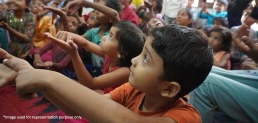Have you ever noticed how excited kids get when they talk about their day at school? That moment when they come home bursting with stories about what they learned, who they played with, or the drawing they made in art class. Most times, all they really want is for someone to listen and show they care. And when parents do that, just by being present and interested, it makes a huge difference. Kids feel valued, and they naturally want to share more, do more, and try harder.


That’s the power of parental involvement in education. It creates a space where learning isn’t just restricted to school premises; it becomes a comfortable routine that the whole family supports. In fact, a study by the Harvard Graduate School of Education found that students whose parents are involved in their education are up to 15% less likely to miss school regularly.
In this blog, let’s understand the parents’ role in education of their child, and explore ways to encourage them to get involved in underserved communities for the holistic progress of both children and their communities.
Also Read: From Child Labor to Future Scientist
Why parental involvement in education is essential
There’s a positive correlation between a child’s educational journey and a parent’s involvement. Let’s understand how this relationship positively impacts.
- Impact on the child’s behaviour
When parents understand the importance of education and pass that value on to their children, they tend to show fewer behavioral problems. There is a behavioral shift in terms of responsibility, self-discipline, and respect both inside and outside the classroom.
- Impact on social skills and classroom behaviour
Parents who take time to talk about school, help with group activities, or simply listen to their child’s concerns indirectly shape their social skills. These children grow more confident, cooperative, and empathetic in classroom settings.
- Impact on the classroom environment and teachers
When teachers know that parents are equally committed to the children’s growth, it encourages them to tailor their teaching strategies to meet each child’s specific needs, knowing they have the parents’ backing.
- Impact on children’s grades
Academic achievement is one of the most quantifiable outcomes of parental involvement. Students perform better in reading, writing, and practical activities, as regular interactions with their parents make them feel accountable and motivated to do better.
Also Read: An Ambassador Grows in Madanapalle
Roles of parents in education
Parents don’t need to be subject experts or have a certain background to support their child’s education. Every parent can play a meaningful role just by showing up in small but consistent ways. Here are a few simple ideas to begin with:
- Read with your child: Even 20 minutes a day can boost their vocabulary and spark a love for stories and language.
- Help with homework and activities: You don’t need to know all the answers. Simply guiding them on where to find help or just being there as a supporter or cheerleader can make a big difference.
- Talk about school: Ask open-ended questions like, “What made you smile today at school?” It gets them thinking and sharing more.
- Attending Parent-Teacher Meetings (PTMs) and other school functions helps build trust and gives you a clearer picture of how your child is doing.
- Encourage learning outside the classroom: Simple activities like nature walks, coloring, or visiting a museum can boost your child’s learning and curiosity. Education doesn’t have to stop when school ends.
Ways to encourage parental involvement in education in underserved communities
In many underserved communities, education often takes a backseat to early marriage or child labor. But this can change when parents are informed and encouraged to take an active role in their children’s learning. Here’s how:
- Community-Driven awareness programs
When school authorities and local leaders like the Panchayat or Village Sarpanch work together to launch programs that highlight the parents’ role in education, it builds a sense of responsibility. These efforts can include workshops, local meetups, and community radio initiatives in regional languages.
- Open parent-child communication
Creating safe spaces for conversations between parents and children encourages emotional bonding and builds a stronger foundation for educational support.
- Involving parents in career counselling sessions
When parents understand the aspirations and academic pathways of their children, they are better equipped to guide and motivate them through school and beyond, instead of disrupting their potential with child marriage or child labor.
- Advocating for education policies
When parents in underserved areas form peer groups to voice their needs for children, it results to better school facilities, transportation, or teacher availability, thus ensuring their children are not left behind.
- Encouraging participation in school functions and decision-making
Extracurricular activities planned for parents through events like sports or programs like Village Health and Nutrition Day (VHND) encourage them to demand the best for their children. When parents work closely with school authorities, they also begin to reflect on functional and infrastructural issues, which helps in evaluating and improving school strategies overall.
- Making school resources accessible
When schools share communication materials like brochures and progress reports that reflect both the school’s and the child’s development, it sparks curiosity among parents and also creates a sense of accountability for both the school and the child.
Change that CRY America brought with the parents
In a village in Korba, Chhattisgarh, the sudden transfer of two out of four schoolteachers left classrooms half empty. Children began losing interest in unattended subjects, and their right to quality education was at risk. When they shared this with their parents, the community came together and decided it was time to speak up.
With the support of CRY’s Parents’ Group and the School Management Committee (SMC), and guidance from CRY America’s Project GMSS team, the parents took action. They submitted petitions to the concerned authorities, demanding the immediate appointment of teachers. After consistent follow-ups, two new teachers were appointed. Today, 63 children are back in class, learning with confidence and without interruption.
Conclusion
Every child deserves the right to quality education, and parental involvement in education is a key pillar in making that right a reality. In underserved communities, educational qualification isn’t a barrier to parental involvement, but a lack of awareness, often rooted in poverty, is. When parents are made aware and empowered, their positivity flows down to their children and future generations.
CRY America has already made a difference by actively educating parents on the importance of their children’s education and encouraging their involvement, but the journey is far from over. Donate now to help build a world where no underserved child’s dreams are held back due to a lack of support at home.
Recommended for you
























